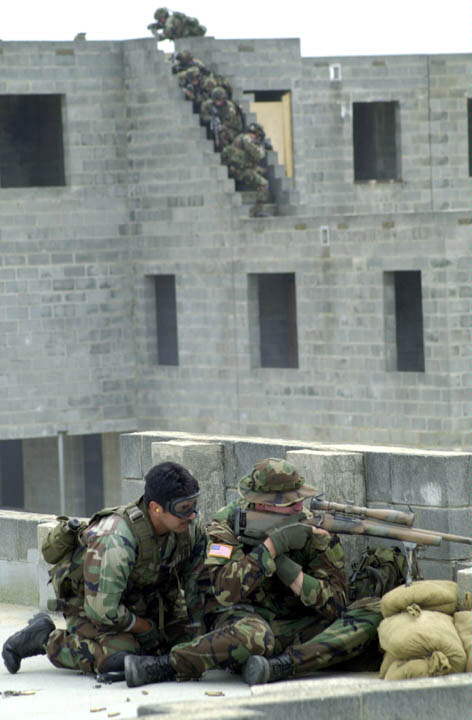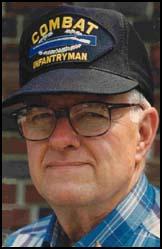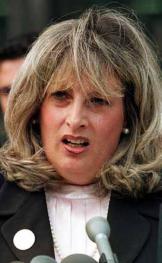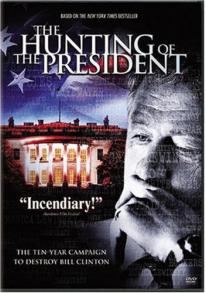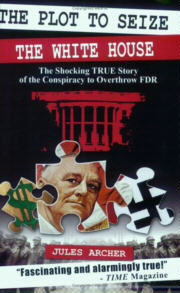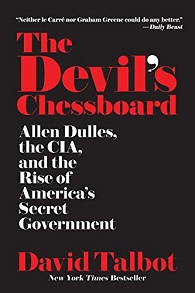|
The CIA School of Assassination at Fort Bragg
"Sometime in the early Fifties ... assassination became an instrument of U.S. national policy. It also became an important branch of our invisible government, a sizable business, and a separate technology involving weapons and devices the ordinary taxpayer paid billions for but was never permitted to see, except perhaps in the technicolor fantasies of James Bond flicks." --Andrew St. George, journalist for Life magazine, cited by Gaeton Fonzi, The Last Investigation "Young people often ask me whether I would recommend that they apply for a job at the CIA. I used to say, 'Only if you have high degrees of integrity and courage.' Now I tell them that when they are asked to sign the secrecy agreement, they should emulate President George W. Bush by adding a signing statement -- the same kind of disclaimer the President issues when he signs legislation. Theirs might read, 'None of the above shall be construed as impinging on the undersigned's duty under U.S. and international law....'" --Ray McGovern, former CIA analyst, Time magazine, 1 May 2006 "A great deal of the success of the CIA is due to its ability to attract patriotic, good soldiers who believe in the general rightness of what they do, and then insulate them through compartmentalization from the heavier activities." --John Stockwell, former CIA Chief of the Angola Task Force, The Praetorian Guard: The U.S. Role in the New World Order "Everything is compartmentalized in the government. You're given an order: 'OK. You're going to take this from point A to point B.' That's all you know. You don't know the big picture. You're just operational, at operational level, doing things that you're made to do." --Jesse Ventura, former Governor of Minnesota, relating his experience as a U.S. Navy SEAL, interviewed on the Opie and Anthony Show, 8 April 2008 "A need to know operation is central, not only to the CIA, but for organized crime or anything else. The information is imparted to individuals on a need to know basis. If you try to inquire, just one time, if you show some curiosity, just one time, as to what is going on, then you won't be around. You'll either be dead, or you'll be ostracized. Not only is it isolation from top to bottom, but latterly as well." --Chaucey Holt, CIA contract agent and Mafia associate (also identified as one of the "three tramps" photographed in Dealey Plaza), interviewed by John Craig, Phillip Rogers and Gary Shaw for Newsweek magazine, 19 October 1991 "We were conditioned by childhood experiences to believe that these were noble and right things to do -- defending our country from the evils of this, that, and the other.... At the lower levels in the CIA, they keep the conditioning going -- the cover stories. You donít talk punk talk, you donít talk goon talk, you donít send a cable to headquarters saying, 'send me out an assassin to knock off somebody.' If you did, youíd get put down, youíd get reprimanded. It's all very high minded. There is some doublespeak and at a certain level, operations are killing people -- certainly. But, especially for the younger officers, they keep the myths going." --John Stockwell, former CIA Chief of the Angola Task Force, in a lecture given at American University entitled, Secret Wars of the CIA, 3 November 1989 "It's called in the intelligence lexicon, 'plausible deniability.' If they [CIA hired guns] perform actions that might embarrass the United States government, they can be denied [as being employed by the government]." --William Leary, Merton Coulter Professor of History and winner of the Central Intelligence Agency's Studies in Intelligence Award, interviewed in the documentary, Air America: The CIA's Secret Airline An aspect of plausible deniability was even incorporated into a popular 1960's American TV show: "The American television series Mission: Impossible premiered in September 1966 on the CBS network. Most episodes began with the leader of the Impossible Missions Force (IMF) getting orders from a hidden tape recorder and an envelope of photos and information which explained the mission. The tape always began with "Good Morning Mr. Phelps/Briggs", explained the situation, and ended with "Your mission, should you decide to accept it", with a brief explanation of the goal of the mission, along with a reminder that "as always, should you or any of your IM force be caught or killed, the Secretary will disavow any knowledge of your actions." --Wikipedia "A lot of times you really didn't even know what the project was. You were told to go to a certain place and accomplish a certain thing. And if you didn't have a need to know, you didn't ask any questions." --Allen Cates, CIA pilot discussing Black Ops in the documentary, Air America: The CIA's Secret Airline "Any of the contrived situations described above are inherently, extremely risky in our democratic system in which security can be maintained, after the fact, with very great difficulty. If the decision should be made to set up a contrived situation, it should be one in which participation by U.S. personnel is limited only to the most highly trusted covert personnel. This suggests the infeasibility of the use of military units for any aspect of the contrived situation." --part of a 1962 declassified Pentagon document, code named Operation Northwoods, describing how pull off a false flag black operation, under the U.S. democratic system, without being exposed.
Fort Bragg and the Assassination of President John F. Kennedy
"Military and intelligence officers did not take kindly to Kennedy's attempts to restrain this powerful conglomeration. Kennedy angered these men by refusing to use U.S. military power to salvage the Bay of Pigs Invasion. Then he added fuel to the fire by rejecting recommendations by the joint chiefs to bomb the missile emplacements in Cuba and to refrain from signing a nuclear test ban treaty with the Russians.... Some generals -- including Dallas mayor Earle Cabell's brother, Gen. Charles P. Cabel -- even went so far as to brand Kennedy a 'traitor.' Cabell, after being fired by Kennedy as deputy director of the CIA, resumed responsibilities in the Pentagon." --Jim Marrs, Crossfire: The Plot That Killed Kennedy Bobby Kennedy came up talking to John Kennedy and saying, "You know, if you go too far in negotiations with Kruschev and with the Communists, you're going to get assassinated. People in this country don't want the President of the United States to make deals with the Communists." --Pierre Salinger (JFK's press secretary), video interview
"Iíve just been given a list of the most recent casualties in Vietnam. Weíre losing too damned many people over there. Itís time for us to get out. The Vietnamese aren't fighting for themselves. Weíre the ones who are doing the fighting. After I come back from Texas, thatís going to change. There's no reason for us to lose another man over there. Vietnam is not worth another American life." --President Kennedy, speaking to his Assistant Press Secretary Malcolm Kilduff in the Oval Office on 21 November 1963, the day before his assassination, cited by James Douglass, JFK and the Unspeakable: Why He Died and Why It Matters "In my last conversation with him [President Kennedy], I'll always remember that he said, 'As soon as the election is over, I'm going to get the boys out of Vietnam.'" --Tip O'Neill, former House Speaker, interviewed in the documentary, Beyond "JFK": The Question of Conspiracy "If I tried to pull out completely now from Vietnam, we would have another Joe McCarthy red scare on our hands, but I can do it after Iím reelected. So we had better make damned sure that I am reelected." --John F. Kennedy, cited by his special assistant Kenneth O'Donnell, Johnny, We Hardly Knew Ye: Memories of John Fitzgerald Kennedy "Kennedy had proved his manhood in the Solomon Islands and did not have to prove it again. He was a prudent executive, not inclined to heavy investments in lost causes. His whole Presidency was marked precisely by his capacity to refuse escalation -- as in Laos, the Bay of Pigs, the Berlin Wall, the missile crisis." --Arthur Schlesinger, Jr., President Kennedy's special adviser on Latin America, Robert Kennedy and His Times "We were deeply concerned that Khrushchev would respond [to an attack on Cuba] with an attack on Berlin, where he had the geographic advantage, and with nuclear weapons, which would have transformed that local battle into a terrible global struggle." --Theodore Sorensen, Special Counsel to John F. Kennedy, interviewed on CNN.com/ColdWar, 29 November 1998 "President [Kennedy] heroically kept the country out of war -- against relentless pressure from hard-liners in the Pentagon, CIA and his own White House, who were determined to militarily engage the enemy in Berlin, Laos, Vietnam and especially Cuba. Kennedy knew that any such military confrontation could quickly escalate into a nuclear war with the Soviet Union. And he realized that a full-scale invasion of Cuba or Vietnam could become hopelessly bogged down, turning into a bloody and endless occupation.... The only reason Cuba didn't become the Iraq of its day was that Kennedy was too wise to be snookered by hard-liners into this trap. He had already been misled early in his administration by the CIA, which convinced him that its ragtag army of Cuban exiles could defeat Castro at the Bay of Pigs. JFK vowed that he would never again listen to these so-called national security experts...." --David Talbot, Salon, "The Kennedy Legacy vs. the Bush Legacy," 2 May 2007
"Arthur Schlesinger Jr., in his book 'Robert Kennedy and His Times,' documents other episodes showing President Kennedy's determination not to let Vietnam become an American war. One was when Gen. Douglas MacArthur told him it would be foolish to fight again in Asia and that the problem should be solved at the diplomatic table. Later General Taylor said that MacArthur's views made 'a hell of an impression on the President ... so that whenever he'd get this military advice from the Joint Chiefs or from me or anyone else, he'd say, 'Well, now, you gentlemen, you go back and convince General MacArthur, then I'll be convinced.'" --Roger Hilsman, Assistant Secretary of State for Far Eastern Affairs under President Kennedy, letter to The New York Times, 20 January 1992 "In retrospect, the reason for the assassination is hardly a mystery. It is now abundantly clear ... why the C.I.A.'s covert operations element wanted John Kennedy out of the Oval Office and Lyndon Johnson in it. The new President elevated by rifle fire to control of our foreign policy had been one of the most enthusiastic American cold warriors.... Johnson had originally risen to power on the crest of the fulminating anti-communist crusade which marked American politics after World War II. Shortly after the end of that war, he declaimed that atomic power had become 'ours to use, either to Christianize the world or pulverize it' -- a Christian benediction if ever there was one. Johnson's demonstrated enthusiasm for American military intervention abroad ... earned him the sobriquet 'the senator from the Pentagon....'" --Jim
Garrison, On the Trail of the Assassins "[Richard] Schweiker told me in his opinion the CIA was responsible for the [JFK] assassination. That's a heck of a statement to come from a United States Senator and one who had even been Ronald Reagan's running mate in 1976." --Robert Tanenbaum, former Deputy Counsel for the U.S. House Select Committee on Assassinations, Probe, "The Probe Interview: Bob Tanenbaum," July-August 1996 (Vol. 3 No. 5) "When I mentioned about Adlai Stevenson, if he was vice-president there would never have been an assassination of our beloved President Kennedy." --Jack Ruby's comment to reporters while being transferred to his prison cell. When asked to explain what he meant, Ruby (Oswald's killer and a probable conspirator in the JFK assassination) replied, "Well the answer is the man in office now [Lyndon Johnson]." Note: Adlai Stevenson advocated a conciliatory approach to international affairs in stark contrast to Democratic Party hawks like Lyndon Johnson. Johnson assumed the presidency following JFK's murder and escalated the Vietnam War exponentially. With his comment, it seems that Ruby was dropping a hint about the assassination -- that the JFK conspirators could not have achieved their goal of putting a hawk in the White House had Stevenson been Kennedy's vice-president instead of Johnson. "Just let me get elected and then you can have your war." --Lyndon Johnson, cited by Stanley Karnow, Vietnam: A History (Johnson made this comment to the joint chiefs of staff at a White House reception on Christmas Eve 1963, one month after the JFK assassination.) "I am not going to lose Vietnam. I am not going to be the President who saw Southeast Asia go the way China went." --Lyndon Johnson, cited by Tom Wicker, J.F.K. and L.B.J. (This is what Johnson told Ambassador Henry Cabot Lodge in the Executive Office Building, on the Sunday afternoon following Kennedy's murder.) "Well, what [Lyndon] Johnson did was, he did one thing before he expanded the war [in Vietnam] and that is he got rid of one way or another all the people [in the Kennedy administration] who had opposed making it an American war. Averill Harriman, he was Under Secretary of State, he made him roving ambassador for Africa so he'd have nothing to do with Vietnam.... He found out that I'd spent part of my childhood in the Philippines, and he tried to persuade me to become ambassador to the Philippines.... Johnson was a very clever man.... He knew who were the hawks and who were the doves. He systematically rid the top layers of the American government of the doves...." --Roger Hilsman, Assistant Secretary of State for Far Eastern Affairs under President Kennedy, interviewed on CNN.com/ColdWar, 8 June 1996
Fort Bragg and the Character Assassination of President
William J. Clinton "If it can be done to John F. Kennedy in 1963, it can be done to another president in the future. And we can't afford to have coup d'etats in America, no matter how cleverly orchestrated and sinisterly contrived they may be. That cannot be permitted to happen. And the way you prevent that from happening is to expose those elements of government and society in this country that were responsible for the killing of John F. Kennedy." --Dr. Cyril Wecht, interviewed in the documentary, The Men Who Killed Kennedy: Part 1: The Coup D'etat "Mr. Clinton better watch out if he comes down here [to Fort Bragg]. He'd better have a bodyguard." --Jesse Helms, Republican Senator from North Carolina, speaking to the Raleigh News & Observer on the 31st anniversary of the JFK assassination, 22 November 1994. (Helm's comment reflected the widespread hostility of the military establishment, and its right-wing allies in Congress, to President Clinton's efforts to decrease military spending in the post Cold War era, and allow gays to serve in the military.) "There are other ways to kill a leader these days -- you can assassinate his character." --former presidential candidate Gary Hart, cited by David Talbot, Salon, "The Mother of All Cover-Ups," 15 September 2004 "There is a right-wing [apparatus] and I know what it is, I've been there, I was part of it and, yes, they were trying to bring down Bill Clinton by damaging him personally ... by any means necessary." --David Brock, appearing on CNN's Crossfire, 10 March 1998 "It was a small intricately knit right-wing conspiracy -- and I'd like that clarified." --Ann Coulter, far-right TV pundit, admitting her knowledge of an anti-Clinton conspiracy, cited in The Hartford Courant, 25 June 1999
"[Linda Tripp] had top security clearance from the Pentagon, and had worked as a secretary in the Army intelligence command and in the elite forces, the Delta Force. She was hired by the Bush administration in the White House, where she was known as an effective assistant, and was recommended to the Clinton administration." --Danish newspaper Jyllandsposten, 24 January 1998 "This move against Clinton was obviously very carefully orchestrated, it was carefully timed and carefully coordinated, everything was in the right place, at the right time, it took a lot of organizing, to pull this off. It has all the air of a destabilization." --John Erickson, professor at the Defense Studies Department of Edinburgh University, regarding the "Bimbogate" scandal against President Clinton "Today, millions of Americans are asking themselves, how is it possible that the Commissar [Kenneth Starr] who spent $40 million in an investigation on an alleged $40,000 real estate speculation, the Whitewater case, ended up investigating the sexual life of Clinton." --journalist Gianni Riotta, writing in the Italian daily Corriere della Sera, 27 January 1998 "Monica Lewinsky is what the CIA and the KGB used to refer to as a 'honey trap' -- a temptress that is used to blackmail the enemy." --from the website: http://surftofind.com The CIA School of Assassination at Fort Bragg
|
